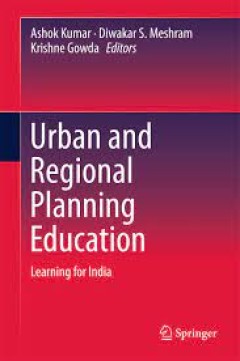Filter by

The computable city :histories, technologies, stories, predictions
"A history of how computers are being used to simulate cities which in turn are increasingly being built from those same computers which are being embedded into the city's social and economic fabric"--OCLC-licensed vendor bibliographic record.
- Edition
- -
- ISBN/ISSN
- 9780262377850
- Collation
- 1 online resource
- Series Title
- -
- Call Number
- -

GrowthFrom microorganisms to megacities
OCLC-licensed vendor bibliographic record.
- Edition
- -
- ISBN/ISSN
- 9780262354516
- Collation
- 1 online resource (688 pages).
- Series Title
- -
- Call Number
- -

Downtime on the microgrid :architecture, electricity, and smart city islands
Something good about the smart city: a human-centered account of why the future of electricity is local. Resilience now matters most, and most resilience is local--even for that most universal, foundational modern resource: the electric power grid. Today that technological marvel is changing more rapidly than it has for a lifetime, and in our new grid awareness, community microgrids have become…
- Edition
- -
- ISBN/ISSN
- 9780262357005
- Collation
- 1 online resource (264 pages).
- Series Title
- -
- Call Number
- -

Urban humanities :new practices for reimagining the city
Original, action-oriented humanist practices for interpreting and intervening in the city: a new methodology at the intersection of the humanities, design, and urban studies. Urban humanities is an emerging field at the intersection of the humanities, urban planning, and design. It offers a new approach not only for understanding cities in a global context but for intervening in them, interpret…
- Edition
- -
- ISBN/ISSN
- 9780262356985
- Collation
- 1 online resource (336 pages).
- Series Title
- -
- Call Number
- -

The smart enough city :putting technology in Its place to reclaim our urban f…
Why technology is not an end in itself, and how cities can be "smart enough," using technology to promote democracy and equity. Smart cities, where technology is used to solve every problem, are hailed as futuristic urban utopias. We are promised that apps, algorithms, and artificial intelligence will relieve congestion, restore democracy, prevent crime, and improve public services. In The Smar…
- Edition
- -
- ISBN/ISSN
- 9780262352246
- Collation
- 1 online resource (240 pages) :illustrations.
- Series Title
- -
- Call Number
- -

The new science of cities
A proposal for a new way to understand cities and their design not as artifacts but as systems composed of flows and networks.In The New Science of Cities, Michael Batty suggests that to understand cities we must view them not simply as places in space but as systems of networks and flows. To understand space, he argues, we must understand flows, and to understand flows, we must understand netw…
- Edition
- -
- ISBN/ISSN
- 9781461950332
- Collation
- 1 online resource (xx, 496 pages)
- Series Title
- -
- Call Number
- -

Invented Edens :techno-cities of the twentieth century
Tracing the design of "techno-cities" that blend the technological and the pastoral. Industrialization created cities of Dickensian squalor that were crowded, smoky, dirty, and disease-ridden. By the beginning of the twentieth century, urban visionaries were looking for ways to improve both living and working conditions in industrial cities. In Invented Edens, Robert Kargon and Arthur Molella t…
- Edition
- -
- ISBN/ISSN
- 9780262276733
- Collation
- 1 online resource (viii, 190 pages) :illustrations, maps.
- Series Title
- -
- Call Number
- -

E-topia :"urban life, Jim--but not as we know it"
"The global digital network is not just a delivery system for email, Web pages, and digital television. It is a whole new form of urban infrastructure - one that will change the forms of our cities as dramatically as railroads, highways, electric power supply, and telephone networks did in the past. In this book, William J. Mitchell examines this new infrastructure and its implications for our …
- Edition
- -
- ISBN/ISSN
- 0585108978
- Collation
- 1 online resource (184 pages)
- Series Title
- -
- Call Number
- -

Megalopolis :the urbanized north-eastern seaboard of the United States
OCLC-licensed vendor bibliographic record.
- Edition
- -
- ISBN/ISSN
- 9780262367936
- Collation
- 1 online resource (810 pages) :illustrations, maps.
- Series Title
- -
- Call Number
- -

Urban and Regional Planning Education Learning for India
This is the first volume exclusively dedicated to planning education, with a focus on India and learning from global experiences for India. Prior to the 1990s, planning education in India was largely confined to national and local economic concerns. Within a globalized scenario, such pedagogies and theories have become outmoded. With new concerns emerging in planning, new pedagogical tools and …
- Edition
- -
- ISBN/ISSN
- 978-981-10-0608-1
- Collation
- -
- Series Title
- -
- Call Number
- -
 Computer Science, Information & General Works
Computer Science, Information & General Works  Philosophy & Psychology
Philosophy & Psychology  Religion
Religion  Social Sciences
Social Sciences  Language
Language  Pure Science
Pure Science  Applied Sciences
Applied Sciences  Art & Recreation
Art & Recreation  Literature
Literature  History & Geography
History & Geography